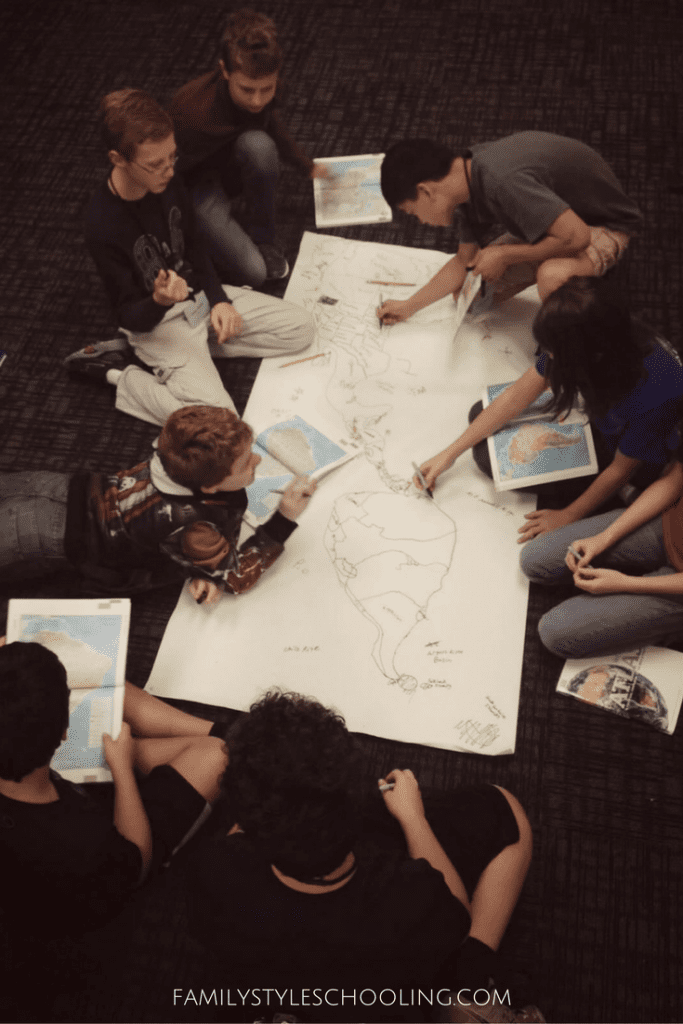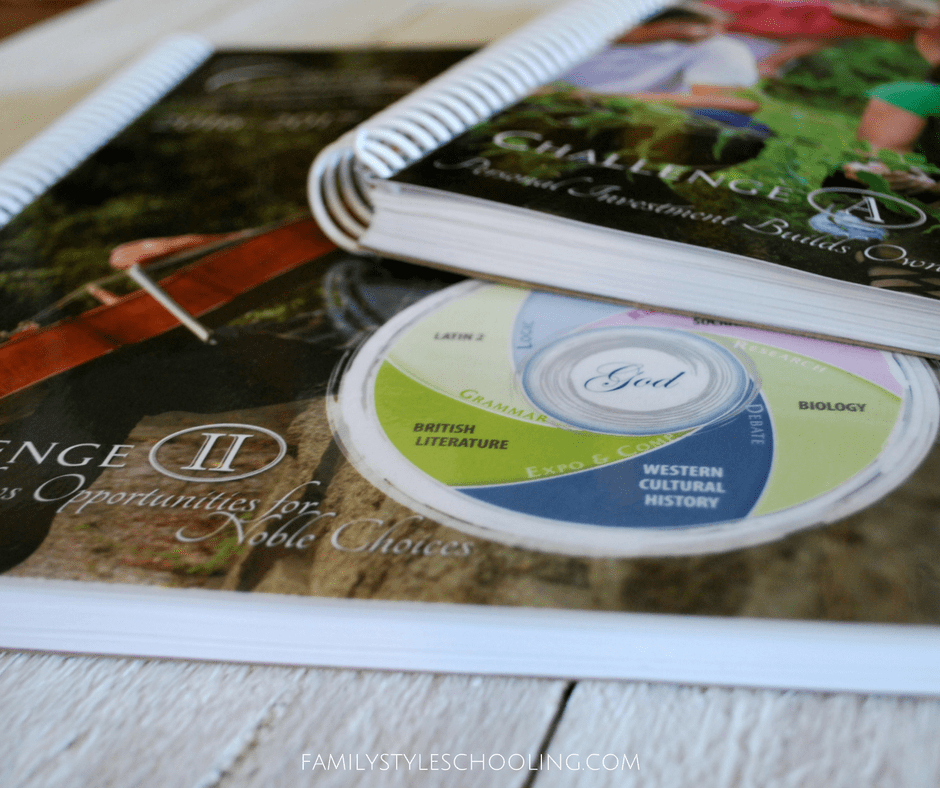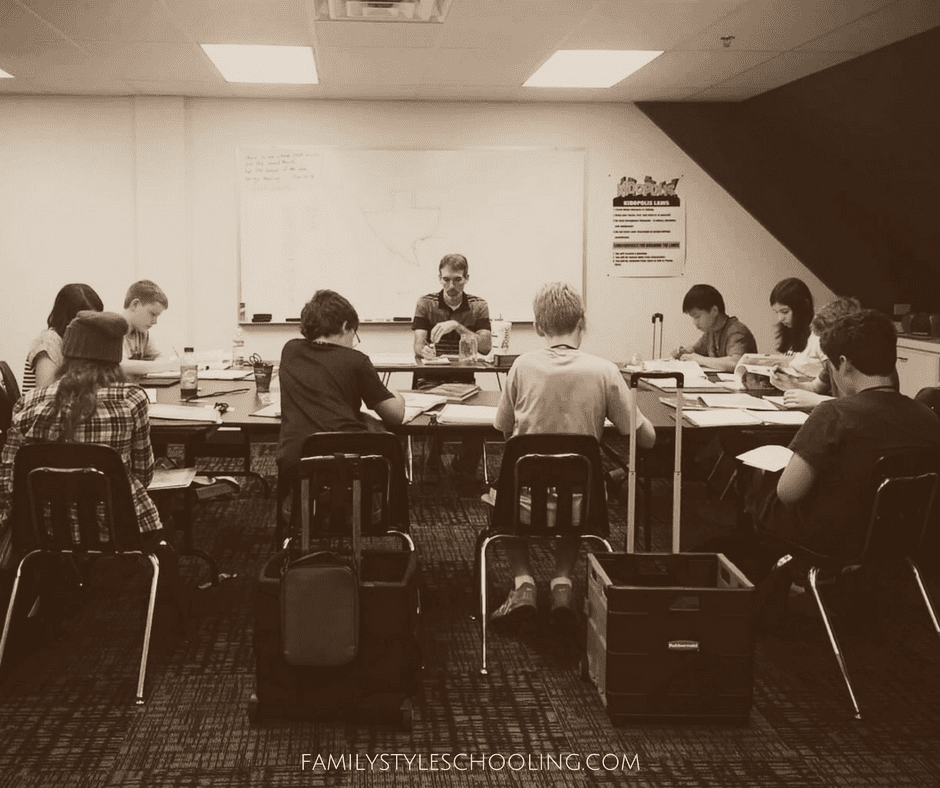The Time it Takes to Direct CC Challenge Programs
I'm in my fourth year of directing a Challenge program for Classical Conversations. I started off in Challenge A with my oldest, then moved up to Challenge B, and Challenge I with him. This year, I went back down to Challenge A again to tutor my daughter's class. My husband directed Challenge A last year, and is now directing Challenge II with our son. Even though we both direct, we operate very differently. I recently received an email asking about how much time it takes to direct a Challenge program. Since I can't put a number on it, I decided I'd share some thoughts about where Challenge directors spend their time.

Just a side note...this post is not sponsored in any way by Classical Conversations, nor is it to be read as an official source on Challenge directing. Your best source for accurate information about your particular community is your local Support Representative.
The Time It Takes
There are three main elements of directing that will take time: learning the material, preparing for community, and equipping the parents/teachers. The time required to complete each of these elements will be different for each director. Here are some things to consider:
Time to Learn the Material
I think this is what freaks most people out. Since many of us did not receive an education that equipped us to retain and communicate the things we've learned, the idea of learning six strands of material in order to lead a decent discussion is intimidating. Here are some things to keep in mind:
- You can't learn it all. Even though you might want to do everything that the students are doing, we don't have the available time to learn it all. Pick one or two seminars that you really want to dig in to. Focus on learning those well. The time it takes to do that is varied by seminar and by the person studying. If you've never studied Latin, it's going to take some time to learn. The value is that you've struggled through it, and then you know how to help the students struggle through it.
- You don't need to learn it all. Your job as a director is not to be an expert. This was a hard one for me. We're not lecturing in class, we're leading discussions. Therefore, you simply need to be familiar with the material, equipped to ask questions, and curious about what the kids think. It's so easy to get side tracked by what discovery of your own that you want your students to discover, that you miss what truth they need to discuss. It's an issue of good, better, or best. A good conversation discusses the basics of a topic of study. A better conversation leads students to a deeper truth that a mentor is guiding them towards. A best conversation is one where students discuss truth that answers a burning question in their soul. If they have the opportunity to form an opinion, and they've arrived there themselves, then they will remember that conversation for years to come.

When do I get this done?
- Summer time prep is a great time for getting your head wrapped around a subject. This is generally when I read the novels for the year, mark them up, and think through them. If they're marked well, they will be easy to review before you need to discuss them in class. Then I typically focus on one other seminar to work all the way through during the summer.
- On years when I was a new director, I'd spend an hour a day studying, or set aside one evening a week to fit in what I could. Again, I'm not going to be able to master it all, but that's okay, because I don't need to.
Time to Prepare for Community Day
Knowing the information is a great start towards being prepared. You're also going to need time to plan out how you're going to present the material, facilitate conversations, and engage the students.

This can be done while you're studying, but it's most effective if you do it on a week-by-week basis. Teaching is an art form. If you're committed to a plan that you imagined would go well, but is missing the mark, then you're not serving your community well. By planning as you go, you can make adjustments as you go.
This usually takes me around an hour a week. I'm also on my fourth year of directing. It will be different for everyone. In this hour, I plan out my time for each seminar, gather materials, and print off any additional handouts (these are minimal, and not weekly).
If you're new, you may have to spend a little more time learning how to direct in addition to learning the materials. Here are some resources for learning how to direct:
- Summer training at the practicum. This three day training is in the afternoons of a local 3 day practicum. The focus of your challenge training is practicing facilitating the conversations. You won't get detailed instructions for each seminar here, but don't worry, there are additional resources to follow up this training.
- Learning Pathways - Once you're contracted as a director and have attended your director licensing orientation (DLO), you'll get access to an online resource (the Classical Portal) that has online trainings, archived videos, and additional documents intended to equip and prepare you for directing. I leaned heavily on these videos my first year.
- Director Forum - This is another resource in the Classical Portal. It is a place where you can ask specific questions to the program team and other directors about your Challenge level. I subscribe to the feed so that I can see the conversations going on about whatever Challenge level I'm directing. It can be overwhelming to hear all the chatter if you're new, so make sure you guard yourself there!
- Facebook Groups - There are also several Facebook groups for sharing encouragement where I find great inspiration. Warning: these groups are not official, so you might get totally side tracked there! Keep the serious questions for the forum, and the inspiration/fun ideas for the Facebook group.
Time to Equip the Parents/Teachers
The last element of directing that takes time is equipping your parents to teach their children. Since this task also has many variables, I'll just talk about what you'll need to consider if you're directing.

Typically, a director holds parent equipping events before class starts in addition to an orientation for the parents and students. These will vary depending on the needs of your parents. In Challenge A, I held equipping events for Latin and the Lost Tools of Writing. In Challenge B, we worked on Latin and Logic. In Challenge I, we worked on Policy Debate. It really just depends on what your families need.
- How old/new is your community? If this is the first year of Challenge in your community, you'll carry an extra weight of helping families learn along with you. My first year directing Challenge A was like this. However, if you're signing on to direct a Challenge level in a community where Challenge has been around for years, you'll have a greater pool of resources for all kinds of additional things like field trips, socials, and additional equipping.
- How new are your parents? Even in established communities, if the majority of your moms are new to the Challenge program, they'll need a little extra help. This is time spent on phone calls, answering emails, or on library days. This will look different week to week as well.
- How many parents do you have? I've tutored classes of five and classes of twelve. The volume of parents will add to the time you spend equipping them and communicating with them. However, with a smaller group, you might spend more time just because you develop deeper relationships.
A Directing Dad's Take on the Time Issue
For the men out there (or wives who are thinking about asking their men to direct), I thought I'd interview my husband on his perspective on the time it takes to direct.

Do you have to know everything to direct?
There is a misconception that you have to know everything before directing. A little humility goes a long way. It all comes back to cultivating character. If you tend to see yourself as an expert, it can be a hindrance, because directing a Challenge program is probably not what you expect it will be. You have to be flexible and humble.
This is a "caught" not "taught" program. The goal is to facilitate discussion so that young people will have a safe place to learn to be free thinkers. Your community will struggle if you know everything yet communicate in a rude way. However, if you're compassionate and can put yourself into their shoes, that will go a lot further towards cultivating an environment of learning. Anxiety is a major problem of our culture. If you foster anxiety by being anxious, you're not serving your community well.
How do you balance supporting a family and directing?
This will be unique to every individual. Since I have a flexible job and work from home, I schedule my work to leave a day open for community day. In order to be ready for directing, I plan my calendar to include 1-2 hours a week to prepare for our class. This can be early in the morning, late at night, or on the weekends. I have to be intentional about my preparations. It's definitely doable.
How do you survive as one of the only men in the community?
This took a while to get used to. Once I realized that the women were encouraged to have a male leader present, I felt much more comfortable. Generally the relationships I'm developing are centered around the students rather than the mothers, because that's who I'm spending time with on community day. Most of my communication with the parents is through e-mail. There is an occasional phone call, but if I need to speak with a mom directly, I find them on community day to have that conversation.
What are your tips for new directors?
- Know the guide well. Know how it's structured. This helps to know how to direct and encourage the parents and students. Most of the questions they ask you are answered in the guide. You can direct them there if you know where to look.
- Know where you're going. Continue to look ahead in the guide. Some assignments need advanced warning, or stuff sneaks up on you.
- Know yourself. How do you study? How much time do you need to read through things? If you have weakness, use the parents and students to fill in the gaps. I'm horrible at games. The kids aren't. I can assign specific kids to come prepared with a review game for the class to make that a more effective tool.
- Know your class. Find out who your talkers are and who your wall flowers are. Know how to ask different kinds of questions to different types of students. The environment you cultivate in class is just as important as knowing the material well.
- Know the Word. Always look for ways to bring your discussions back to God's truth, character, and attributes. Compare the ideas authors bring up with Biblical truth. If you know God's Word, it will anchor you in directing discussions.
What questions do you have about directing Challenge programs?
Betsy Strauss is an unexpected homeschooler, mother of three, who is in a relationship with a sweet man for life. She loves reading books, drinking coffee, and learning anything with her kids.


Love, love, love this! Thanks so much for a peak into TWO directors’ experiences! This really helped me!
Thanks Renee! So glad it helped!
Betsy!
This was so extremely helpful. Thank you not only for your viewpoint but your husband’s as well. I truly am blessed by your posts and wise insights.
I’m again praying about taking on this tutor/director role. Our community is fairly new and I forsee questions that may come up with bringing CC to our area. One main question: What have you seen or experienced that sets CC apart from other programs/curriculum out there? I can come up with a couple ideas, but I’d be interested in your thoughts now that you’ve done 4 years of challenge.
I’m considering being a Challenge director this year. Is there a difference between directing and tutoring or are these terms interchangeable when it comes to the Challenge levels?
I live on Maui and CC is coming to the island for the first time this year! We’re very excited, but it’s late in coming (now mid June.) Do you think there’s ample time to prepare for adding Challenge in (outside of practicum)?
Side note: I have 4 years of CC under my belt, but I’ve never seen Challenge in action – just Foundations and Essentials.
Thanks for your post! It really helped me get a better feel for what’s coming for my 7th grader!
You’re right, tutor and director are interchangeable. You’re the tutor because you lead the discussions in class, and you’re the director because you receive the monies for the program directly, whereas in Foundations/Essentials, those jobs are separate.
I think you still have plenty of time to prepare for Challenge! How exciting to be a part of helping start a new community. And your years of Foundations/Essentials are a great preparation for moving up to challenge. Blessings on your year!
Just another director’s experience:) — I’ve been tutoring Challenge 1 for 6 years, and to feel comfortable, I still need a minimum of several hours to look over the material, make my plan, gather supplies, and print anything I need. I can wing it if an emergency comes up, and I don’t have much time, but I try not to do that. I also spend at least an hour a week on email, and several more hours when progress reports are due or when writing up evaluations/feedback for in-class presentations (although I have finally gotten much faster with that!). I don’t have to learn Latin anymore, but in the last few years we have introduced Lost Tools and Music Theory. Whenever there is a new curriculum, it takes me a few more hours to prepare during the week. I’ll never be an expert on any of these subjects, but I want to do the homework so that I can truly model how to learn. Directing has been a great experience for me.:)
Thanks for sharing your experience!
Do the kids start week 1 before class starts or am i teaching week 1 asthey do week 1
They have some assignments before week 1, but that first week is usually an introduction to everything. The guide is set up where it has the students work “preparing for week 1” followed by the instructions for what to discuss in class week 1. Generally your job as a tutor is to follow up on the work they did, but that doesn’t mean that you won’t teach anything. It’s just not teaching like a mainstream school would look like.
Hi Betsy, Thank you for taking the time to write this, and for sharing your husband’s thoughts too! I know you said a tutor doesn’t need to “know it all” but I’m wondering if, in your opinion, it is possible to Direct/tutor Challenge I with no prior knowledge or experience with any challenge? I have a son going into challenge 1 but I have been tutoring Foundations (just this past year for the first time, and we’ve been doing CC for almost 2 now). I can understand I wouldn’t be expected to know all the Latin or any subject– but I don’t know ANY and the in Challenge I they will be in their 3rd year of Latin, and so on. I love learning but I’m a slow learner! thanks for any honest and real input you can give!
Challenge I covers a lot of content, but it’s actually a pretty good year to jump in as a tutor, and the primary reason is that there isn’t much that is new to the students. You’re not teaching them how to write a LTW paper, they’re just writing a lot of them; you’re not introducing them to a brand new language, they’re just continuing to build their understanding of the grammar. In those ways, tutoring Challenge I is really fun because the students are ready to take on more responsibility in the class and you can lean on them especially when you don’t know the answers as long as you’re curious and desire to learn more. I struggled with the science when I tutored Challenge I, but I had a student who LOVED it, and so during our discussions, I’d ask some questions and if some concept became muddled for the class, I’d ask that student if he could explain it another way. He was a quiet one in the class, and his love of science really blessed our class and drew him out into conversation. I love Matt Bianco’s article about this very idea: Ack! I Don’t Know Latin (or Math) My last encouragement is that if God is calling you to tutor, He will equip you. Trust in His ability to fill in the gaps and enjoy watching Him work through you!
Betsy, I had forgotten about this post and that I wrote to you! We’re in the middle of getting ready to move (which is why I am considering tutoring, there’s no Challenge programs in the town or close area where we’re going) and we’re praying about the many, many decisions and we’re overwhelmed. BUT, having just found this post again and your answer, I am encouraged! Thank you for taking the time to reply, for helping with your detailed answer, and for encouraging!! Your last statement is what it all boils down to, so I will just keep praying God makes it very clear if He is calling…(Maybe a post for another time, how to know when God is calling, or how YOU knew God was calling you to tutor challenge…:)) Thank you, Thank you!
Thanks for sharing this! My husband and I were just taking how we’d love to see some more dads involved! Our oldest is only 9, but we’re spending a lot of time talking through the high school years right now, and one of my husband’s biggest concerns is the lack of male leadership in the homeschooling world for our son.
We were also wondering, do either of you have any thoughts on how chemistry, physics and calculus with CC compare with the education a child would get ina more conventional school setting? I love homeschooling, bit this question keeps coming up with other family members. Especially (worst case scenario!) if you have a group of students who all struggle with math and science with a director who can’t help much?
Thanks so much!
Laura
Laura, it is great to have my husband around, and I’ve seen many more dads getting involved as the program grows. Hopefully your community grows in this as well. As far as the upper maths and sciences go, you really can’t compare to a conventional school setting. A conventional school setting would have an expert that gives daily instruction teaching the student. In CC, the parents are still the teachers at home, so the tutor isn’t expected to be the expert that will give them everything they need to know to complete the material. What we’ve experienced is that students are much more equipped to self teach by Challenge 3 & 4 when those subjects come up, ans so they’re working through the material successfully either on their own or with their classmates. In class, they gather to discuss the difficult concepts and work through labs. This helps them solidify their understanding because they’ve also become better question askers and seekers of truth. These skills are so valuable to equip them for future studies in the math and science fields. There are really so many resources out there though if you need more help: online classes, instructional DVDs, dual credit options…and I could go on. Our students are learning the skills of thinking and that gives them the opportunity to thrive in any subject whether their parent or tutor knows more than them or not.
Thank you so much for this helpful blog. I am currently directing Challenge A and moving up to CH B with my class. I’m also the Support Representative for our area. I plan to share this with all of my Challenge directors, especially the new ones! The thought of directing a Challenge class can be daunting. This practical advice does a great job of showing how an ordinary parent truly can direct a Challenge program. Thank you!
This is not a director question it’s more of a parent question what is the difference between challenge A and challenge B. We started late and I am not sure if I should just put her in B because that’s where she is supposed to be but last year we were in essentials straight out of public school.
That is such a tough question! I see benefits to both options. I see Challenge A as a bridge to the Challenge programs. It lays a nice foundation for Latin, persuasive writing, thinking skills, research, and taking ownership of your education. Students continue to grow in their memorizing skills as well as learning to manage their time while the workload increases. Challenge B is also a bridge, but it works more on cultivating a love of thinking deeply about the topics they’re studying. In the second semester, there are many semester long projects that cultivate a desire to keep thinking beyond the surface and dig deep into big ideas. I wouldn’t be in a hurry to skip Challenge A because of how great it is. I’ve seen seniors in Challenge A classes and be totally blessed by their time there. My oldest started Challenge A when he was 13, and it has really blessed him to be the oldest in his class. He is finishing Challenge IV this year, and he has been thankful for a little extra time at home. However, he could have graduated last year and been totally fine as well. I just didn’t want him to miss out on the beauty of Challenge IV. Hope this helps!
I am considering tutoring Challenge A next year and have always told myself I could never tutor challenge. Foundations was my comfort zone! Now that I have a child going into challenge and no one to tutor I am feeling the call to step up. Your post gave me some much needed confidence and I am feeling like this is doable…Thanks for taking the time to share!
That’s wonderful! The fact that it is outside of your comfort zone makes you a great tutor for the students! You will struggle with them, but in watching you struggle and persevere, they’ll be inspired to do the same. My first Challenge A class I tutored just graduated and I’m so thankful to have been a part of their journey. It is truly a blessing to be a part of their lives in this way!
Betsy, this is such a thoughtful post and I am truly grateful for the honest insights you have shared here. You are a blessing!!
This is very helpful! Considering and praying about directing next fall. Thank you!
Thank you for this post! I am a former F&E tutor and will be moving to a community where there isn’t a CH B director for my oldest daughter. I have spent 1-3 hours a week prepping for Essentials (coming up with my own sentences to parse, inventing math games, studying HBW, reading papers), so I’m familiar with putting in the time. I’ve just been very worried about how much I’m supposed to know going into Ch B. Your response above about God equipping me if I’m called to tutor is just what I needed to read! Thank you!
Wonderful! Yes, trust Him without trying to be the expert. That is so hard in our culture, but He is still training my heart to be dependent. He gives strength and wisdom!
I am planning on directing CH I in the fall and although I am eager to be the lead learner, I already see the challenges that I may have to overcome! Thanks for this encouraging post.
Challenge I is an action-packed year! I’ve directed it three times and I could still learn so much more. I think that is what really makes it rewarding though. Students appreciate learning with you and parents really benefit from the struggles you have in learning the material. I hope you enjoy it as much as I did!
Thank you for this! I’m so nervous as I start my first year directing next week (B). I go from excited to wanting to cry with anxiousness. Your article was great encouragement! Blessings to you! My kids (3) will be B, B, A. ❤️
Thank you for your wisdom!
I am a first time CHB director and I am spending some much more time on preparing every week. How are you preparing in only 1-2 hours? Do you read all the books/short stories/ weekly assignments that the students are reading weekly?
As a tutor, I am not doing all of the assignments they are doing, but reviewing them and facilitating discussions on them. Typically I read most of the literature books in the summer to prepare. If I’m working with my students on a certain subject like Latin, I don’t count that as my prep time, but my parenting time. You won’t master all subjects in your first tour as a tutor, and I found Challenge B particularly difficult to jump into as a tutor because there were so many elements to the program that I did not receive in my K-12 education or college. I found things I was stronger in and then looked for other resources that could help me facilitate well even if I didn’t have all the answers. You’re the lead learner, so you don’t have to be an expert at all of it! There isn’t enough time in a week! Hope this helps!
What an amazing article!!!
Thank you for all the tips and reassurance.